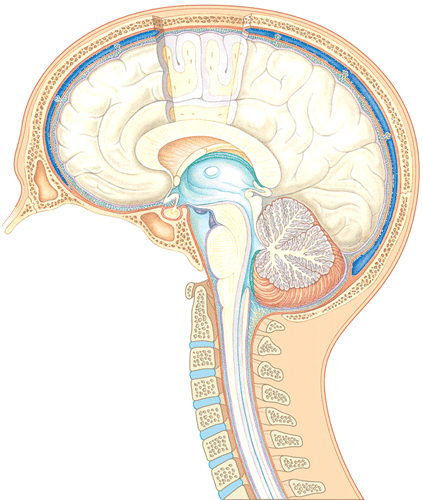| Q: |
What are the triggers for migraine?
|
| A: |
Many triggers can start a migraine attack. Any situation or
substance can act to excite the brain cells of someone with migraine and
trigger an attack. These range from stressful events and hormonal
changes to drugs and changes in the weather (see Range of migraine triggers, for a detailed list).
|
| Q: |
How do migraine triggers cause an attack?
|
| A: |
Migraine triggers cause hyperexcitable brain cells to become more
excited by either acting directly on them or by increasing the level of
epinephrine (a chemical that excites brain cells). Some scientists
believe the triggers do not start the attack but simply intensify the
symptoms of an attack already underway. Once the brain cells reach a
certain level of excitation, an attack is triggered. Some studies have
shown that the electrical reaction of the brain cells is more sensitive
to a stimulus not only during an attack but also in between attacks.
|
| Q: |
What is the most common migraine trigger?
|
| A: |
The most common trigger for a migraine attack is emotional
stress. This is understandable since an emotionally stressful event or
situation brings on what is called the “fight-or-flight” response.
During such a response, epinephrine is released, which can hyperexcite
brain cells and bring on an attack.
|
| Q: |
Is emotional stress the only thing that causes the “fight-or-flight” response?
|
| A: |
No, the “fight-or-flight” response is the body’s protective
reaction to any thing or situation that threatens harm. “Stress” for the
body could be, for example, low blood sugar or oxygen levels, low blood
pressure, or any stress related to a medical illness.
|
| Q: |
Why do some things trigger a migraine attack in some people but not in others?
|
| A: |
Triggers tend to vary among individuals. Many people with
migraine can identify specific triggers while others have no idea. Some
people know that they are more susceptible to one trigger than another.
In some cases, several triggers work together to increase the likelihood
of an attack. Each trigger affects the brain even if it doesn’t lead to
an attack; the closer triggers are to one another, the more likely it
is that a migraine attack will occur. Often, a trigger is present hours
to days before the attack but only when it combines with another trigger
does it bring on a migraine attack.
|
| Q: |
Why do I need to identify and avoid triggers?
|
| A: |
If you are able to identify and avoid or eliminate some of your
triggers, you may be able to reduce the frequency of your attacks. Some
studies have shown that trigger identification and avoidance can be as
effective as daily preventative medications for migraine. Moreover,
medications for migraine can become less effective if attacks occur too
frequently.
|
Range of migraine triggers
Migraine triggers may
be internal (coming from inside you) or external (coming from your
external environment). The list below gives some of the main triggers.
External triggers:
Stressful events
Food/drink
Food additives
Schedule or time changes
Sleep disruption
Changes in eating habits
Weather change
Altitude change
Intense heat or cold
Intense light, sound, or odors
Overuse of certain medications
Drugs
Internal triggers:
Migraine and the stress response
An appreciation of
the “fight-or-flight” stress response helps you understand why certain
situations trigger migraine attacks. During this response, epinephrine
excites the hyperexcitable brain cells further, causing a migraine
attack. Beta-blockers—drugs that block the effects of epinephrine—are
very effective when used to prevent attacks.
Any situation that
threatens the delicate balance of the body activates the stress
response. This response prepares the body to react to the stressful
stimulus, whether this is a physical threat, such as an attack by a wild
animal, or an emotional stress, such as taking an exam.
Although the stress response
is both vital and valuable, it can also be disruptive and damaging. The
response, which evolved to prompt animals to fight or run away from
harm, can be misplaced in human society. Humans rarely require the
intense physical action generated by this response, yet our biology
still provides it. When the stress response is activated repeatedly, it
can have a harmful effect on the body. For some people, it can be a
frequent trigger for migraine attacks.
The stress response
During stressful situations, messages are carried along nerves
from the cerebral cortex (where thought processes occur) to the
hypothalamus. The hypothalamus activates autonomic nerves (nerves that
carry information about automatic bodily processes) in the brain stem
and prompts the release of epinephrine. This causes an increase in heart
and breathing rates, blood pressure, and blood sugar levels, a slowing
of the gastrointestinal tract, and dilation of the pupils. These changes
prepare the body for fight or flight.
